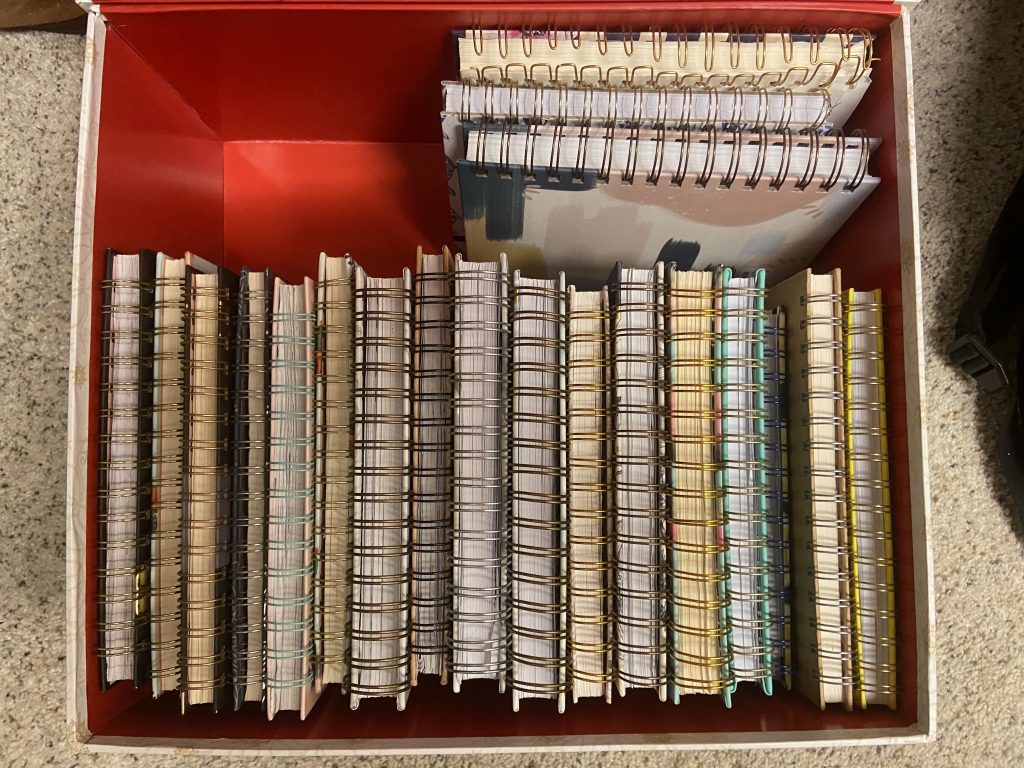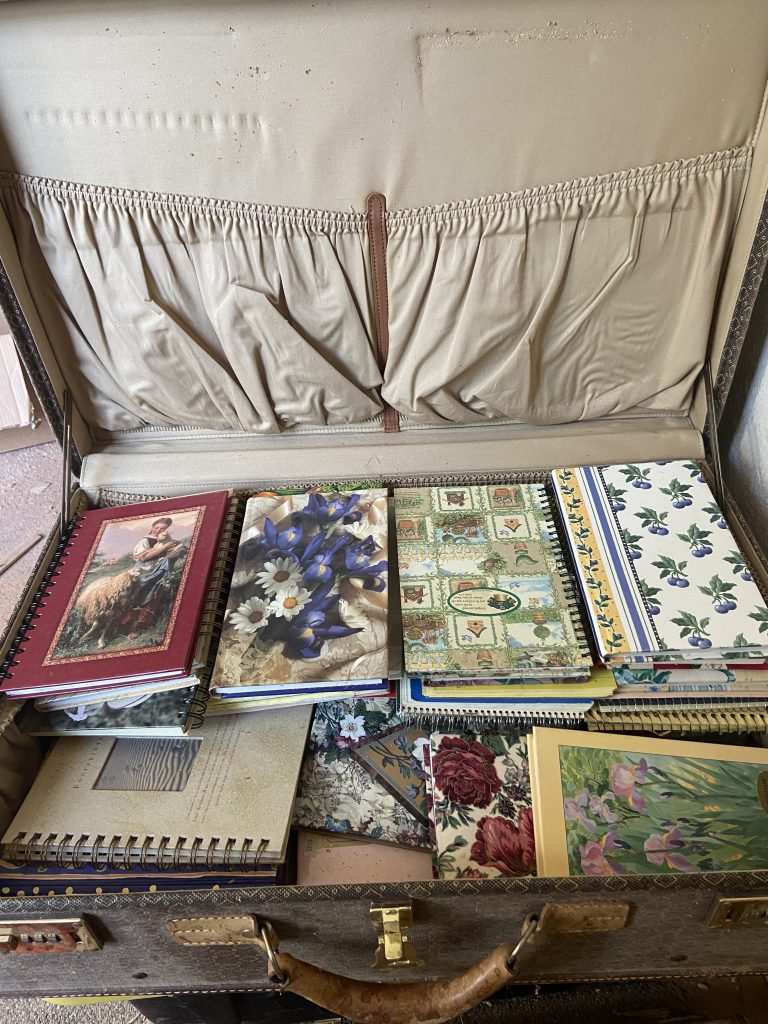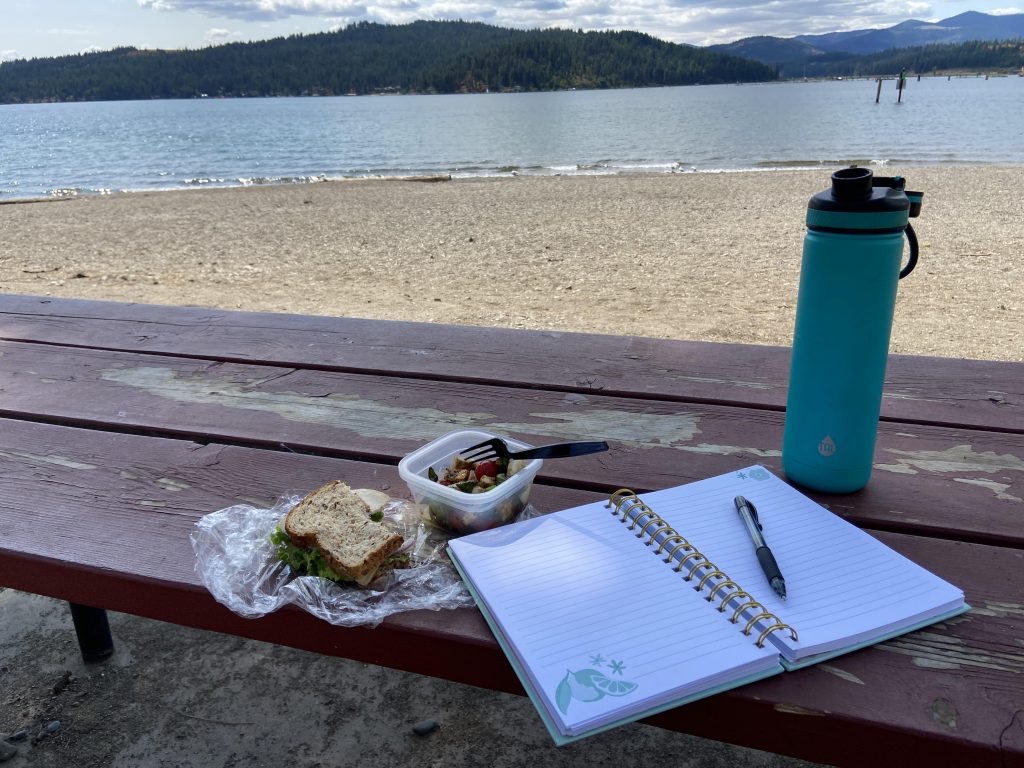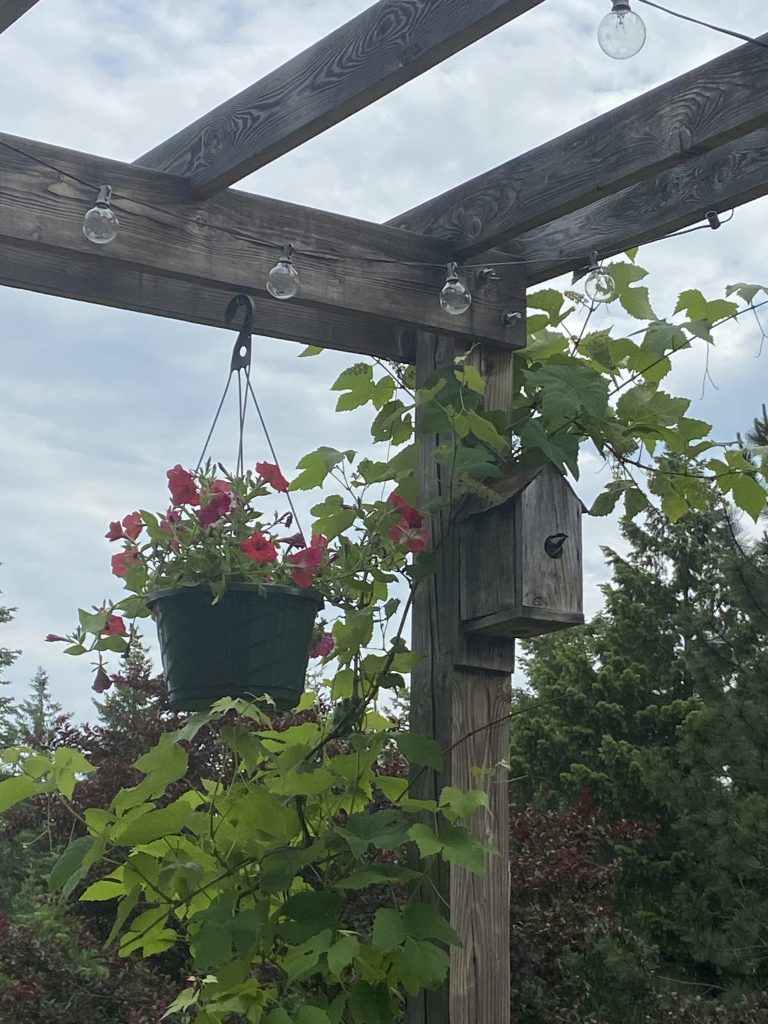Never before have I felt like I am living my life as true to myself as I do now. Why now? Is it the wisdom that comes with age? Or is it being retired? Or perhaps it is all those years of journaling that are paying off? Most likely it is a combination of all three. You certainly gain wisdom with age. And being retired offers you the freedom to spend more time doing what you enjoy. However, you can gain wisdom and have all of the time in the world to do what you want, but if you don’t know how to apply it to your life, it is useless. That is where journaling comes in. It is that deep thought process that pulls it all together. It is where we look at ourselves in the quiet depths of the written word and learn about who we really are and what we want in life. It is where we are honest with ourselves without concern for what others think. We are free to pour out our hearts and in doing so we grow deep roots. We learn who we really are, down in our core. The next step is living that out and letting our lives reflect it.
“The unexamined life is not worth living.”
Socrates
There is a ton of research out there on the benefits of journaling. For example, a 2018 article by Dr. Jeremy Sutton in Psychology Today, identified ten physical, cognitive and emotional benefits of journaling your thoughts and feelings:
- Lowered blood pressure
- Improved lung and liver function
- Less time spent in the hospital
- Better moods
- Improved psychological wellbeing
- Fewer depressive and avoidance symptoms
- Reduced stress-related visits to the doctor
- Less work absenteeism
- Less time out of work following loss of a job
- Higher student grade averages
I have been journaling for over 40 years. Yikes! Believe me when I say that is A LOT of journals. I don’t feel obligated to journal every day and I don’t follow any particular guidelines. I just let the pen fall on the paper and let the words flow out. It can range from what is happening in my life, or goals I have for myself, to how I am feeling about my life and situations that come up. I have only one rule I follow: I try to never write anything bad about someone in my journals. I will write about situations or feelings, but not directed at any one person. If you feel like you need to vent about someone in particular, I recommend that you do so and then shred or burn it. We never know if we will die tomorrow and someone will read it and be hurt forever. That is never the point of journaling, nor is it the collateral damage you want from your journals. Burning or shredding them can also be symbolic of letting go of those negative feelings about someone.


The three greatest benefits I receive from journaling
- It is a pressure release valve. Several studies show that journaling decreases stress by releasing it in the written word. I know that it has helped me to work through many stressful periods in my life. It has also helped me to do quite a bit of problem solving. I believe it has benefited me physically as well. So far, I do not have to take any prescription medications and I attribute most of that to good genes, a great support system and a heck of a lot of journaling.
- Increased sense of well-being. This seems to be particularly true when you identify what you are grateful for. It can be something very simple, but it turns your thoughts in a positive direction. I have read several articles that suggest writing a gratitude journal. Write down at least three things you are grateful for with each entry. Some studies revealed a decrease in depression when participants journaled regularly.
- Self-discovery. I think this is one of the greatest benefits of journaling. When we become adults we get so busy building our careers, taking care of our homes and raising a family that we often lose ourselves in the process. We forget what makes us feel alive. Our careers and family often bring us great happiness and joy, but once you strip all of that away, what makes YOU happy? Not how others help make it happen, but what makes that happen for you without the influence of others? Who are we, now that the kids have flown the nest and the careers we spent so much time building are over? I have a feeling that women, more often than men, tend to lose themselves trying to make life wonderful for everyone else. Most of us will turn ourselves inside out and upside down in order to make everyone else around us happy. There comes a time when we have to ask ourselves, “What makes me happy? What makes my soul sing?” Journaling helps us figure that out, because somewhere in our busy lives we forgot what that was. We tend to be pulled and swayed by other people’s opinions and expectations. You need to dig deep and create your own style that fits you. Journaling helps you to figure out what that it is. I know it has helped me to rediscover who I am and what I love.
I always say that journaling is my “cheap therapy.” After all, six dollars for a lovely journal from T.J. Max, and two dollars for my favorite gel pen are a small price to pay compared to a weekly visit to a therapist. While I receive so many benefits from journaling, I fully recognize that it is not for everyone. I don’t think that you can force journaling any more than you can force someone to like running. It has to be an innate sense of who you are and how you desire to release your creative flow that makes you feel centered. However, if you are interested and would like to give journaling a try, I have a few tips to help you get started.
First, I recommend an attractive journal that will fit in a bag or purse in case you want to take it with you. I always take it with me when I travel. I also like to take it with me on solo walks or bike rides in case I find a great spot to sit and write. Second, don’t feel pressured to write every day, but when you do write, be sure to include the date, time and place. This gives you perspective, should you go back and read it later. Third, start small. Just write whatever thoughts are on your mind that day. Consider using a prompt to trigger your writing, such as asking “what was I doing the last time I felt total freedom?” Or write three specific things you are grateful for. Or write down some short and long-term goals. People that write goals down are much more likely to achieve them. Fourth, your journal should be your sacred, private space to write without fear of someone else critiquing your thoughts. Lastly, while it needs to be a place to let your thoughts flow, try not to let it be a negative space where you vomit all over the page. Add humor and gratitude to it. Keep it in as positive light as possible, while still providing any pressure release that you need. After all, what we think shapes our attitude and how we view the world.

The only downfalls I find with journaling are the cost of pen and paper, the time it takes and the storage space needed for all of my journals! I would say that is a pretty good tradeoff for all of the benefits it provides.
A word of warning. An overexamined life can be an emotional fall off of a cliff. As with most things in life there is a balance. It is that sweet spot of enough… not too much and not too little. (Maybe Goldilocks had it right all along.) Overthinking can contribute to stress and worry. It can also cause paralysis by analysis, which I have been guilty of more than a few times. Find that sweet spot and try to stay in it.
I hope I am not the only crazy person out there that feels compelled to journal, not because of the benefits or because they think they should, but because they can’t not journal. (Yes, I know that is a double negative statement, but I have already broken a lot of grammar and syntax rules in my blog so why stop now?) If I do not journal for several days, I start to feel clogged up. Apparently, I must write. I think that is why I enjoy blogging. It is a fun, creative outlet for my need to write. I guess writing, in whatever format, is just built into my DNA.
On the home front

We have some mountain chickadees nesting in the birdhouse on our patio. That is the mamma bird peeking her head out of the birdhouse. She keeps extremely busy removing waste from the nest and returning with food for her babies. As soon as she enters the birdhouse, they each chirp, “me, me, me!” I am surprised that all of the commotion from the wedding and the loudspeakers from the DJ did not scare her off. She is a testament to the commitment and determination of parents fulfilling their role in life. Maybe once they leave the nest, she needs to start journaling?!? Life is good.








I am a fan of the written word & have journaled for years. I find it to be so therapeutic to get thoughts out of my head, some of which are like garbage – if you don’t put it out it starts to stink. Journaling allows me to vent through the good & the bad. I’ve got multiple 3″ binders filled with journaling. Someone once recommended that I donate it to a museum b/c of the social history captured in it. I think not. I’m actually thinking of burning them. I keep a pretty notebook that I write quotes in for future reference. My friend refers to the notebook she keeps as resonance. During the pandemic restrictions, I wrote daily using these prompts from A Boomer Girl’s Guide – What am I grateful for today? Who am I checking in on or connecting with today? What expectations of normal am I letting go of today? How am I getting outside today? How am I moving my body today? What beauty am I creating, cultivating or inviting in today? These questions stand the test of time. I prefer blogs to vlogs; real books vs e-readers. I enjoy word games – scrabble, scattergories, wordle. I also keep travel diaries. I guess I’m a wordie as well as being a foodie.
Hi Mona –
Nice to know that there is another “wordie & foodie” out there. Two of my favs as well. I love your garbage analogy. I considered getting rid of my journals, particularly when we downsize, but I want to reread them in my old age. Since I am certainly not at old age yet, right? I really like the journal prompts. I will definitely use some of them. I particularly like the question about what beauty am I creating, cultivating or inviting in today.
Yah, I have journaled for 50 years or so.
In some kind of lost soul/starting over time, I burned more than the first half of my life. Those years are still with me, although the qualitative researcher in me wants them back to explore (which, of course, would be unlikely😎).
The journal keeps me grounded: dreams analyzed; longings revealed; missteps forgiven. I’m sure there are other ways of self exploration, for the self-reflective life, we all need to find our something…
Hi Sue
That is the big dilemma with journals… to keep or not to keep. I think that the memories might be better than rereading the journals. I think you have captured the essence of journaling perfectly in your second paragraph.